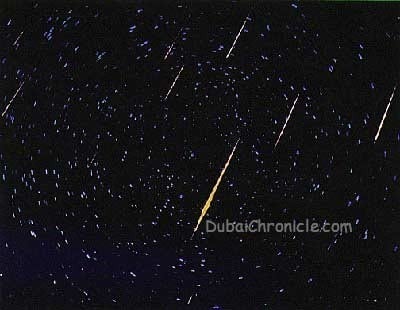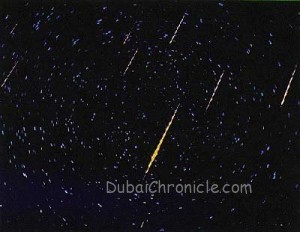
Tonight will be the perfect time to watch one of the most brilliant meteor showers of the year – the Leonid meteor shower, also known as the Leonids. Dubai Astronomy Group said that people in the UAE will be able watch the night spectacle until November 21, but it is expected to peak Monday night.
 The Leonids are one of the last celestial wonders of the year, followed only by the Geminids meteor shower, which will be observed in December. Stargazers should get outside after midnight on Monday night as these will be the best hours to observe the Leonids. And experts say we have a chance to see up to 12 burning meteors per hour, while the predawn hours will have the optimal conditions to witness a fireball. The Dubai Astronomy Group (DAG) is organizing a public event from 9.00 pm till 3.00 am at Mushrif Park tonight. Another way is to watch the sky from your home, but the city lights may ruin the whole experience. A better alternative is getting to the desert, but make sure you wear warm clothes or bring a blanket with you.
The Leonids are one of the last celestial wonders of the year, followed only by the Geminids meteor shower, which will be observed in December. Stargazers should get outside after midnight on Monday night as these will be the best hours to observe the Leonids. And experts say we have a chance to see up to 12 burning meteors per hour, while the predawn hours will have the optimal conditions to witness a fireball. The Dubai Astronomy Group (DAG) is organizing a public event from 9.00 pm till 3.00 am at Mushrif Park tonight. Another way is to watch the sky from your home, but the city lights may ruin the whole experience. A better alternative is getting to the desert, but make sure you wear warm clothes or bring a blanket with you.
According to scientists, this year’s Leonid meteor shower will be dampened by the illuminated moon and in some parts of the world it will be quite a disappointment. However, in the UAE it will still be a pretty sky show. The November meteor shower gets its name from the constellation of Leo, the celestial Lion – the shower’s radiant point, from where the shooting stars seem to spread out, is located within this constellation.
The meteors we see are caused by the comet Tempel-Tuttle, which passes through the inner solar system every 33.5 years. Each time the comet approaches the sun, it leaves a “river of rubble”, a trail of dusty debris. Every November, our planet passes through this debris field of dust and rock and the bits ram into the atmosphere, creating a meteor shower or a true spectacle of tens and hundreds to sometimes thousands of shooting stars. The last time when the comet swept through the inner solar system was in 1998, so in the following years, people on Earth could observe the best Leonids. And this year, astronomers say, our planet will pass through a point of the comet’s orbit, where the concentration of bits of debris is very light. There are only scattered particles, so the Leonids’ activity will be probably lower than the usual.
So, if you are worried you won’t be able to see much of the meteor shower from your local position, you may watch life streams from NASA or Slooh online.






















![The Square at Nad Al Sheba Gardens Now Open hope tax season treated you well! Just checking in—ready to refocus on growing your business? I remember how we discussed scaling your [specific aspect of their business, e.g., online presence] but paused due to time constraints. We now offer a streamlined 6-month plan that delivers real results without adding to your workload. Let me know if you'd like to chat—I’d love to help you pick up where we left off!](https://www.dubaichronicle.com/wp-content/uploads/2024/11/The-Square-5-218x150.jpg)









